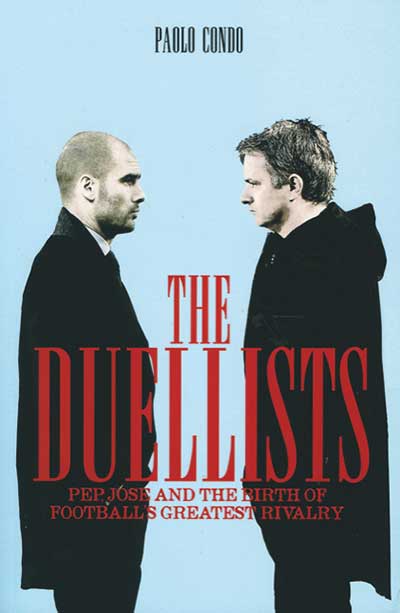
by Paolo Condo
(translated from Italian by Anthony Wright)
DeCoubertin Books, £12.99
Reviewed by Paul Kelly
From WSC 372, February 2018
Buy the book
José Mourinho learned a valuable lesson from the 5-0 drubbing his Real Madrid team suffered at the Nou Camp in November 2010: the tightly cut, well-watered pitch was central to Barcelona’s bewildering pass-and-move football. So, for the return fixture in April the grass at the Santiago Bernabéu was long and dry, on Mourinho’s instructions.
That La Liga match, which ended 1-1, was the first of four Clásicos squeezed into an 18-day period in spring 2011 which are the subject of Paolo Condo’s book. Madrid triumphed in the Copa del Rey final, before Barça emerged victorious in the Champions League semi-final. Fractious and bad-blooded, the clashes lent themselves to psychological warfare between the coaches. At their conclusion Pep Guardiola was mentally exhausted, while Mourinho, suspended by UEFA, was criticised for playing so defensively at home.
Condo covered the four-act drama for La Gazzetta dello Sport. He paints a vivid picture of the rising tensions between the two camps, describing Mourinho’s use of provocative media conferences as “a crucial aspect of his management style”, and the man himself as “the most talented puppet master ever seen in the world of football”.
However, Mourinho’s “declaration of full-scale war” on the eve of the first leg of the Champions League semi-final in Madrid backfired. His listing of referees’ decisions that benefited Barça at key moments on big European nights, and his claim that Guardiola wouldn’t be happy unless the official made a mistake in his favour 24 hours later, provoked a furious response from his rival. At dinner that night Guardiola received a standing ovation from his galvanised players, who won the first leg 2-0.
Guardiola is portrayed as an intense, details-driven planner who some days devoted more than ten hours to video analysis. His nurturing of Lionel Messi is well described, particularly his willingness to let Messi represent Argentina at the 2008 Olympics despite a ruling by the Council of Arbitration for Sport that the club were entitled to his services.
The most astonishing claim is that Mourinho urged his team (2-0 down from the first leg) to play for a 0-0 draw in the return. This would allow blame for Real’s exit to rest on the referee’s expulsion of Pepe six days earlier. The contention is attributed to Diego Torres of El País (a critic of Mourinho), but Condo provides no corroboration of it.
The narrative is compelling. Success in the Copa del Rey enabled Mourinho to recommend that Zinedine Zidane should replace Jorge Valdano as Madrid’s general director. Cristiano Ronaldo’s punishment for questioning Mourinho’s approach was exclusion from their next fixture against Real Zaragoza, prompting him to destroy his locker in frustration.
However, given the book’s sub-title, more detailed analysis of the 2010 Champions League quarter-final tie, in which Mourinho’s Inter eliminated Guardiola’s Barcelona, would have been a fitting prequel. Likewise, when Mourinho cites “the scandal of Stamford Bridge” (the second leg of the 2009 semi-final against Barça when the referee denied Chelsea two clear penalties), early clarification that Mourinho was not in charge of Chelsea at that time would be helpful.